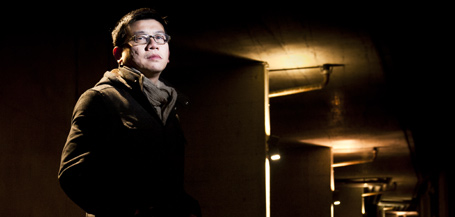LGBT movies from Thailand have scored big at international film festivals. Audiences have laughed their hearts out at campy comedy shows like The Iron Ladies (and its sequel) and The Adventure of Iron Pussy, and wept at romances like Beautiful Boxer, Bangkok Love Story and The Love of Siam. Films like these are packed with positive, upbeat portrayals of queer people, and are rarely censored by the government – a fact that drives us folks in Singapore and Malaysia green with envy.
But not everyone thinks Thai cinema is doing LGBT people a service. Director-screenwriter Kongdej Jaturanrasamee, for instance, claims his country’s filmmakers often aim for mainstream success by turning their gay and kathoey characters into targets for comedy.
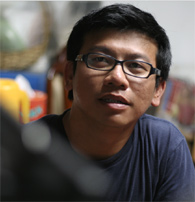
Kongdej, who is straight, has gained popular fame in his country as “the King of Romance”. His breakout hit was The Letter (2004), directed by Pa-oon Chatarasiri: wrote the screenplay as an adaptation of the 1997 Korean film Pyeon Ji. This was a serious tear-jerker: cinemas handed out free tissues before each screening, to prepare viewers for the heartbreaking final scenes. Since then, he’s been hired to work on a variety of mainstream studio movies, including the Tony Jaa martial arts film Tom Yum-Goong (2005).
Meanwhile, gay audiences have gravitated towards his independent works. They’re notable for their sensitive, nuanced and unconventional depictions of queer characters. The first full-length movie he directed was Sayew (2003), the tale of a young female college student who writes erotic stories for a porn magazines and struggles to come to terms with her attraction to a female classmate, Mui. Me… Myself (2007) tells of a gay cabaret dancer injured in a car accident. He suffers from amnesia – and finds himself falling in love with the woman who knocked him down.
Kongdej was recently in Singapore for the Southeast Asian Film Festival, which is screening independent movies from the ASEAN region every weekend in the month of March. Last Friday, audiences watched his film P-047 (2011), a psychological movie centering on two friends who break into people’s houses to “borrow” their lives. In true Singaporean fashion, this screening came with a warning of “homosexual content”, because of the subplot of a gay romance – coincidentally featuring the handsomest two actors in the movie.
We caught with the director for an interview after the screening.
æ: Age, sex, occupation, location?
Kongdej: 39, male, filmmaker, Bangkok.
æ: How did you get started in the film business?
Kongdej: I knew that I want to be a filmmaker since 15. So I studied filmmaking and started my career with a music video director for few years after graduated, making films for rock bands.
I got started as a director then there're some studio hired me to write a screenplay. The success of those projects is starting point of my both career. But in Thailand you can't earn living by only making film. So beside director and screenwriter, I have many other careers such as commercial announcer, commercial songwriter and even writing some graphic novels.
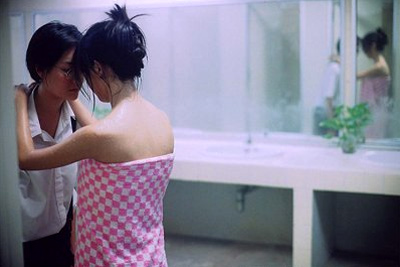
Sayew (2003)
æ: Why have you chosen to use so many gay subplots in your films?
Kongdej: I used these characters for different purposes. In Sayew I wanted the main character to explore her real identity, not just escape like most of Thai people in that period. In Me… Myself, it was to ask the audience about the essence of a human being.
And in P-047, the lovers in the jungle portray the secret you want to bury but, of course, you can't. It is about accepting emptiness in a life even your identity is what you made. Nothing is original. So no matter what gender you are, you can enjoy this movie.
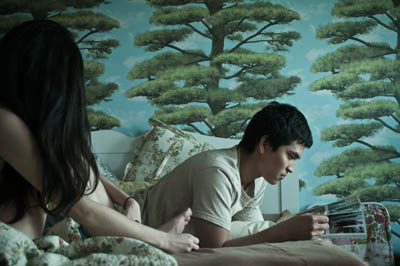
P-047 (2011)
æ: How have audiences reacted to the queer elements?
Kongdej: In Thailand, these elements are so usual. Many Thai films use these characters but in a ridiculous way. These characters become the jokers of the story, overacting, being unrealistic. People love these characters as long as make them laugh.
æ: Yes, I was going to ask why there are so many LGBT-themed films, like The Iron Ladies and Apichatpong Weerasethakul’s Tropical Malady.
Kongdej: The successful films are only the comic ones. Apichatpong's films are totally not successful in Thailand. The major problem in the Thai film industry is not just about this issue; it is that they still treat movies as popcorn for entertainment. So these different films have no space in their interest.
æ: Have you had problems with censorship as a director?
Kongdej: No, I've never faced these kind of problems. I think some censorship boards don’t even get my hidden ideas!
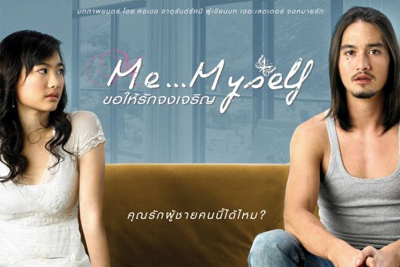
Me… Myself (2007)
æ: What are your favourite films?
Kongdej: Classic question… but hard to answer. There're so many but what I can think of now are Charlie Chaplin’s City Lights and Claude Lelouch’s A Man and a Woman.
æ: What are you working on next?
Kongdej: I'm about to shooting my new project, 11+12, at the end of this March. It should be done within this year. It's my first teenage movie.
æ: If one of our readers wants to start learning about Thai films, what films should he begin with?
Kongdej: Start with any films, but you should learn about both studio and independent films. That will better reflect Thai society nowadays.
The Southeast Asian Film Festival runs at the Singapore Art Museum @ 8 Queen Street until 31 March 2012. For more information, visit singaporeartmuseum.sg/seaff. Tickets are available from sistic.com.sg.

